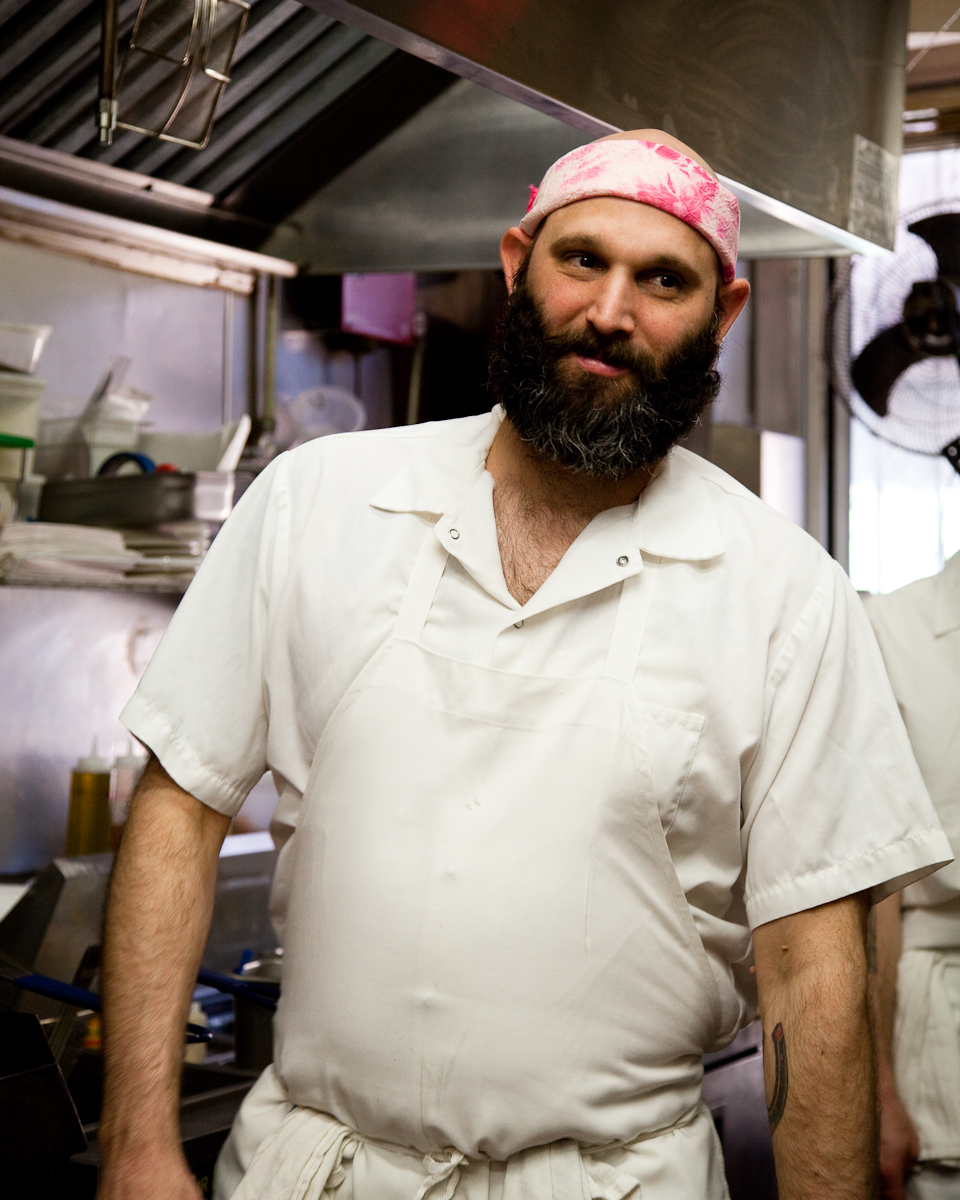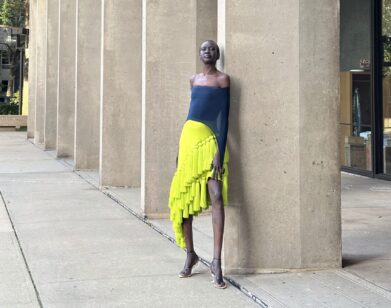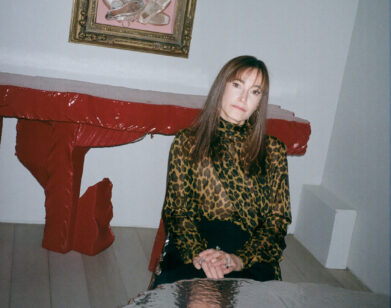Dan Ross-Leutwyler’s Grandfather Clause
ABOVE: DAN ROSS-LEUTWYLER. PHOTOS BY THEA GOLDBERG
“Bushwick” is, these days, contested territory—ask a real-estate agent, a 20-something creative, and a neighborhood old-timer to define the neighborhood’s limits, and you’ll likely get three very different answers.
But Fritzl’s Lunch Box, the new restaurant by chef Dan Ross-Leutwyler (formerly of Roberta’s, Fatty ‘Cue, and the dearly departed Williamsburg spot Bellwether, among others), is indisputably Bushwick, tucked into a homey little spot on Irving Avenue just off the DeKalb Street L train stop. Its décor is as bright and clean as the contents of its menu, which features American classics executed in an often surprising, but never intimidating, way. Witness, for example, the endive salad—which includes tried-and-true ingredients like Shropshire blue cheese and candied walnuts, but which is presented with the endive stacked, almost like a delicious game of Jenga. Or try the burger—seriously, try the burger, which is the result of years of experimentation on Ross-Leutwyler’s part.
Ross-Leutwyler is a laid-back, affable guy, the kind of chef who’s happy to duck out from the kitchen and strike up a conversation with his diners. Sustainability in dining is important to him—though he’s not in-your-face about it—and so is the growing democratization of good food. “I work with people who supply some of the top restaurants in Manhattan, and I can buy the same ingredients,” he says, “now that the market’s blown open.” He’s happy, too, about the “amazing community” of food in Brooklyn, in which he eagerly takes part. He gets the blood for his blood-sausage tamales from a butcher pal; and the banana cream pie on his menu comes directly from Pies ‘N’ Thighs, where one of the co-owners happens to be his wife.
After stopping in for dinner a couple weeks ago, we gave Ross-Leutwyler a call.
ALEXANDRIA SYMONDS: It seems like Fritzl’s is in a sweet spot, size-wise. Even when it’s full, it’s not too loud.
DAN ROSS-LEUTWYLER: Yeah, we have 19 seats inside, and then next weekend I’m having my friends come down and they’re going to build me this beautifully landscaped garden in the backyard. We’ll grill up the veggies and herbs and hopefully be able to help sustain ourselves in the summer with the food that we grow here as well.
SYMONDS: There’s a huge glut of great restaurants around where the Bellwether was, but obviously not so many near your new space. Were you looking to get out of the 12-restaurants-per-block district?
ROSS-LEUTWYLER: It certainly was a conscious decision. Competition in New York is so fierce, and on the one hand, having a lot of restaurants is a tide that lifts all boats because it makes everyone better. But if, for whatever reason, people aren’t coming in, then it becomes very difficult to maintain standards of quality with regards to the kind of food you purchase. For me, to be out here is like taking a step away from the hyper-competitive dining scene of Williamsburg, Brooklyn, and getting a little further away from the city as well.
SYMONDS: Do you know the area you’re in pretty well? Have you done a lot of exploring in deep Bushwick?
ROSS-LEUTWYLER: Not as much as I would like to. The block I’m on is pretty nice. It’s mostly residential. It’s kind of flanked on either side by these really aggressive commercial strips. There’s Knickerbocker Avenue, which kind of reminds me of what 14th Street was in the ’80s, with all these sort of low-end, gray-area stores. And then Wyckoff Avenue, on the other side, is very much given over on the one hand to these ethnic delis but it also has, like, Subway sandwiches and more of the chain restaurants. I was working at Roberta’s four or five years ago, and I guess they call that part Morgantown now. It’s not really proper Bushwick, but that gave me an idea of what the people were like out here, and the flavor of the area, and I’ve been exploring it as much as I can given my work schedule now. The other real deciding factor for me landing out here, though, was economics. I have a very fair rent for the area, and I guess that comes with being a little bit further out ahead of where everyone else is building right now.
SYMONDS: Sure, until everyone catches up with you. [laughs]
ROSS-LEUTWYLER: I mean, I don’t think Irving Avenue is ever going to be Bedford Avenue, but the potential for growth is certainty here.
SYMONDS: So you’ve worked at some buzzy restaurants, obviously.
ROSS-LEUTWYLER: I like to say I’ve worked at every restaurant in Brooklyn that you want to go eat at. [laughs]
SYMONDS: And one in the West Village. I’d love to know what you feel like you learned from each experience—what you’re taking away from Roberta’s, what you’re taking away from Fatty ‘Cue, what you’re taking away from Bellwether.
ROSS-LEUTWYLER: Roberta’s was a great experience for me, because it just sort of taught me to follow your vision and do what you want. People might take some time, but people will eventually come around to it. Carlos, who’s the chef there, he’s a good friend of mine, and there were some lean times. Like, all people wanted to eat there was pizza, and that’s great, but he really just put his nose to the grindstone and started doing some really inventive food, and people really responded to it. So I think that’s my takeaway from there. I also learned how to drink copiously at work. [both laugh] That’s probably another conversation.
I was working at Vinegar Hill House for about a year and a half, and that experience was really instructive to me—it taught me how to make something comfortable, create an atmosphere that people want to be in and how to make really accessible food. Fatty ‘Cue for me was a lot of buzz, and that was great for a few months—but once the buzz died off, I guess it was sort of instructive on how to keep a restaurant fresh and interesting once the buzz has died down. That’s the real challenge. And Bellwether taught me that sometimes it doesn’t matter how good the food is.
SYMONDS: That’s really sad, sorry.
ROSS-LEUTWYLER: It’s okay. I mean, it was a learning experience. I want to take as much away from every experience as I can, and I’m very proud of what I did there. It just wasn’t as well received as I hoped it would have been.
SYMONDS: At Fritzl’s, everything on the menu is under $20. I’m guessing that was deliberate on your part.
ROSS-LEUTWYLER: Yeah, it’s a calculation really based on wanting to be able to offer people something that they can come back for and they don’t feel like they’re breaking the bank. And it’s a challenge for me, because I want to use the highest quality ingredients possible—but generally those things cost more money. So it’s sort of a balancing act for me to not make compromises but to figure out how I can utilize more expensive products in creative ways. I want to buy from the small farms and buy meat that’s sourced sustainably and not such a burden on our environment—which I guess is a very buzzy thing, but it’s something that I truly do believe in.
SYMONDS: How long did it take you to come up with this initial menu, and what were your biggest goals for it?
ROSS-LEUTWYLER: The menu came together very quickly in that I had a clear vision of the kind of food I wanted to serve here. But these are also all ideas that I’ve been playing with in my head for a long time and just haven’t had the right platform to put them out there, because of maybe diners’ expectations at Bellwether or Fatty ‘Cue. Things that might be, on first blush, more downmarket or less “inspired,” but things that I think I can really contribute something new—whether it’s through technique or through repurposing an ingredient or using it a different way. The bacalao sandwich, that’s an homage to a Filet-O-Fish sandwich. [laughs]
SYMONDS: Right.
ROSS-LEUTWYLER: The fried chicken sandwich, for me, there’s a place on Manhattan Avenue in Greenpoint called Palace Fried Chicken that sells two chicken burgers for five dollars. I stopped there many times on my way home, and they’re satisfying —they’re not good, but they’re satisfying. So it’s like, “How can I make something that satisfying using a higher-quality ingredient, and still get people to have that, ‘Oh, wow, really good’ reaction?” But the menu is all classics.
SYMONDS: Can we talk about your burger? It’s amazing, and I know that you’ve been playing with the recipe for a while.
ROSS-LEUTWYLER: [laughs] I think a burger is something people take for granted—it’s a placeholder on the menu. A certain number of people are going to come in and order it because it’s super familiar to them. You know. It’s a burger. I think people don’t necessarily give it the attention it deserves, and they treat it as an afterthought. I just really wanted to try and capitalize on people that are going to try and buy the burger, and give them what I think is just spectacular. It’s been a couple of years of trial and error in terms of figuring out what cuts of beef I want to use, how I want to grind the meat, shape the patties. It’s a blend of cheek and chuck. The cheek, I think, is a real intense beefiness. It’s an off-cut, in the sense that it requires a lot of labor to prepare and clean properly, because there’s a lot of sinew and tendon in it. Cleaning beef cheek is not fun, that’s a real chore. But when you get to the meat itself, it’s so intensely flavored. The chuck has a real nice ration of fat to meat, it’s a very clean-tasting cut of beef, and I think two, in balance and harmony, it makes a really beefy, tender burger.
SYMONDS: I think the way you get used to eating burgers, if you eat burgers in America, is taking big bites of them, because burgers are much bigger than they need to be at most places. They don’t get that fast and really intense infusion of flavors. I took my first bite of your burger the wrong way and was like, “Oh, shit. I need to adjust.”
ROSS-LEUTWYLER: [laughs] Slow it down.
SYMONDS: I almost didn’t recognize you when I saw you, from your photos, because you’ve grown a pretty impressive beard. Was that a superstitious, “I’m opening a restaurant” beard? Or was it unrelated?
ROSS-LEUTWYLER: It started out unrelated. I started out growing out this beard when I was still at Bellwether, because it was getting cold. A good friend of mine, Justin, who does the beer and wine program here, his girlfriend is a barber, and I would go in and she would trim it up for me and keep it neat. Life just got so busy, I was just so busy building this place and then opening it, the next thing I knew, it was just kind of out of control. My wife has made her peace with it. I kind of really enjoy it. I don’t know what the customer reaction is, but it’s a very Brooklyn thing. This is totally unrelated, but I started losing my hair pretty aggressively a number of years ago, and it’s nice for me to have some sort of grooming protocol above my neck. It’s sort of a nice compensation.
SYMONDS: I feel like I have to ask who Fritzl is.
ROSS-LEUTWYLER: Fritzl is my father’s father. Fritz Leutwyler. He used to run a restaurant in the town where his family lived in Switzerland. I must’ve been aware of it in some sense when I was younger, but I had forgotten about it until I had started cooking professionally. Then I always thought it was kind of serendipitous, I don’t know if that’s the right word, but it was funny that I found myself doing this thing that actually was in my family. That I could trace back somehow to something that Fritz was doing. I just thought that was kind of cool and I wanted to pay tribute to that history. I like the way it sounds, too.
FRITZL’S LUNCH BOX IS NOW OPEN AT 173 IRVING AVENUE IN BUSHWICK. FOR MORE INFORMATION, VISIT THE RESTAURANT’S WEBSITE.







